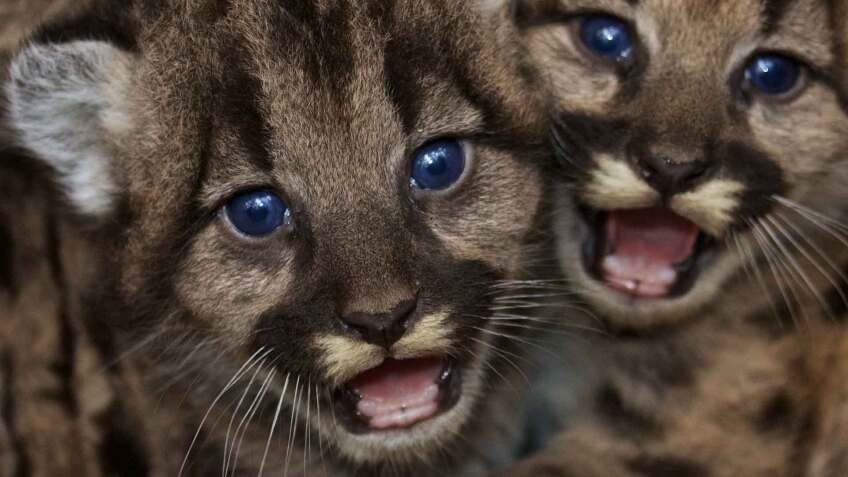Meet Two New Mountain Lion Kittens P-46 and P-47

Two baby mountain lions with stunning blue eyes huddle at the base of a boulder in the western Santa Monica Mountains. One of them hisses at a strange device that approaches their den. But that device – a camera in the hands of a park biologist – means them no harm. It soon gives the National Park Service the first marvelous video of these adorable 3-week old mountain lion siblings, a sister and a brother, called P-46 and P-47. Anyone who watches the video can’t help but call them gorgeous little creatures. And now SoCal Connected brings you an exclusive preview at this rare video.
"In December 2015, we marked two kittens, P-46 and P-47, a young female and male, at three weeks of age in their den. Their mother is P-19 who is roughly six and a half years of age now," NPS biologist Jeff Sikich told KCET's Cara Santa Maria.
Researchers had been tracking their mother since she was a kitten as well. A mountain lion's gestation period is 90 days. This marks her third litter, according to NPS.
NPS researchers were able to get rare footage of the siblings only because they knew that their protective mother was away from the den. Their mother wears a collar that transmits her whereabouts. Researchers waited for the mother to leave the den, allowing them to take a camera and get close-up video of the kittens. They also placed a stationary camera near the den that captured night video of the kittens and their mother.

At about three weeks old, the kittens weighed 3.8 and 4.5 pounds. They are now estimated to be six to seven weeks old, according to Sikich. In the following months, the kittens will follow their mother as she hunts and provides sustenance to them.
"The mom has moved them to a couple of new den site locations. And then in a month or so, the kittens will start to follow mom, too? Hopefully the mom will then continue to make kills as they grow older, and teach them how to hunt and stay elusive, and how to avoid the adult males," said Sikich. Adult males can be a threat to the young mountain lions.
In a year to 18 months the kittens will reach what is called "dispersal age." At that time their mother will most likely abandon them. The young cats will then have to "disperse" or find their own territory. "It'll be interesting to see if mom successfully raises them to dispersal age, and especially where they go from there," said Sikich.
"We haven't seen any young males live to the age of two, besides P-22. You hope to see a successful dispersal." P-22 is the well-known male mountain lion that was discovered living in Griffith Park in 2012.
A total of 47 mountain lions have been marked and studied by NPS researchers since 2002. As they grow up P-46 and P-47 will be part of the NPS study. A veterinarian was able to implant a special tracking device in the abdomens of the kittens when the mother was away. The siblings' father is unknown at this time, pending genetic testing.

"Den work is some of our most rewarding work. It's super cool. We get to hike in and see these animals up close but also see these cute little kittens and follow them, hopefully their entire lives," said Sikich.
The kittens' births are an encouraging sign that mountain lions may be able to survive in and near a metropolitan area of 10 million people. But they may also face the same threats that have killed other mountain lions "? rat poison, freeway traffic and even competing mountain lions. Researchers hope to observe over time whether P-46 and P-47 grow up to have kittens of their own.
SoCal Connected reporter Cara Santa Mariawill have an in-depth story on the mountain lion's struggle to survive in Southern California. Watch for it in February on KCET's award-winning SoCal Connected.
(Photos and video footage courtesy of the National Park Service)